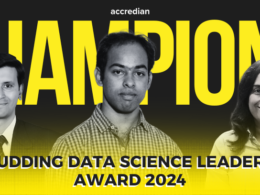A career in Data Science doesn’t necessarily require a degree in Data Science. Sounds strange? Let’s bust some myths together.
The structure has always been that to pursue a certain job role, you require an academic/ advanced degree in that subject.
However, Data Science has always been somewhat of a surprising field and does not follow conventions.
To understand more, you’ll need to look a little more closely at the evolution of Data Science.
Data Science, as a discipline, evolved out of need. With data building up massively after numerous new technological advancements coming into use, patterns and relationships were noticed.
Based on these patterns and relationships, decisions were made by businesses to predict and estimate results. Data Science, essentially, evolved as an application of knowledge from various subjects streamlined to solving particular business problems.
Data Science is Multidisciplinary
An average internet search would reveal that in order to become a sought after Data Scientist, you need to master these three skills:
1. Coding
2. Mathematics & Statistics
3. Domain Expertise
Now let’s dive into each of these skills to see whether you do need to pursue a college degree for these at all!
Coding/Programming
Coding sounds daunting, especially to non-programmers.
But you don’t need to be a hard coder to become a Data Scientist. Also, help is available on every step of the way when it comes to coding!
The 3 most favoured coding languages in the Data Science space are Python, R and SAS. There is so much material available online for these tools that you need not knock college doors for this.
Let’s take a look:
Python
Python is an open-source programming language and ranks the highest in terms of user-friendliness.
It reads like plain English and already has a number of powerful, feature-rich libraries you can easily use and save on a lot of coding time. Since Python is free to use and learn, you can try your hand for free lessons.
R
R is yet another free-to-use programming tool for the community. It is popular among academia and research enthusiasts.
Although R requires longer codes to be written than Python, it isn’t a hard language to learn.
We would also recommend SAS as a programming tool but it is not free to learn and not enough machine learning-friendly to be your best pick.
Mathematics & Statistics
In order to build your own implementation models, you need to have a strong understanding of the applied mathematical concepts like linear algebra and multivariable calculus.
As a Data Scientist, you should know which tests to run and how to interpret the results. Having at least a basic knowledge of calculus and algebra is crucial.
A thorough knowledge of hypothesis testing, probability and inferential statistics and experience in working with statistical models.
When you use statistics, you will aid the stakeholders in designing and evaluating experiments and taking measured decisions.
Skills for a Data Scientist include the need to be acquainted with statistical methods and techniques like maximum likelihood, distributions, estimators, Logistic Regression, Clustering and Linear Regression etc.
Domain Expertise
This is something you develop at your workplace. Learning new and new technical skills is a waste if you can’t put things in perspective.
Remember a Data Scientist’s major responsibility is to solve business problems. Business problems aren’t always clear as day.
A Data Science theoretical knowledge will get you nowhere unless you have reliable domain expertise.
Improving a business process, cutting down on turnaround time, cutting down on costs, enhancing productivity or improving profits is not always a straightforward solution to a given problem.
Many times as a Data Scientist you need to figure out whether a problem exists before you go about hunting down solutions for it. That kind of approach can’t be developed with a myopic idea of how the business works.
In your current role, go beyond your regular job profile to understand business issues and areas of improvement. Depending on the sector or industry you work, the application of Data Science might be different.
This is how you get a combined exposure to all 3 study areas affecting your Data Science education. You might want to check out another helpful guide for your journey.
These are the three areas of focus that you should eye on to become a distinguished Data Scientist.
Why do you not need a Data Science Degree?
A Data Science degree is desirous for everyone because they feel it ensures a Data Science job later on but the truth is, an overall portfolio, exposure and networking affords better chances at landing jobs than a degree.
Let’s take a look at what factors ensure a Data Science job:
Projects and Practice
Data Science projects are what give you more exposure and experience in handling Data Science problems.
Once you master the subject areas, you can practice more and more on projects to build your portfolio and polish your skills of analysis and visualization.
Networking
You need to reach out and connect with professionals in this Data Science space to position yourself seriously.
Build a LinkedIn profile that gives you an edge over others. Optimize it to include your high-achieving tasks and responsibilities. Also, do not forget to include data science related technical words that easily explain your background.
You will also need a GitHub account. Building a team of peers ensures you get reliable answers for a lot of your queries.
Be it help with some technical issue or advice on how to advance your career, people who’ve lived your truth are better equipped to answer you.
While there is no dearth of meeting Data Science experts online, you should grow connections offline as well. One of the best ways to expose yourself to the practical regime of learning is competing with other Data Scientists.
Kaggle is a popular runway where many Data Science careers take off. Participate and compete in challenges on Kaggle.
How to build a Data Science career without a degree?
Investing in a Data Science career takes time.
We have made it abundantly clear in the article, Data Science is not an overnight plan.
Spend some energy in researching the field. This is not a mere certification to add to your profile. Focus on your long term goals when planning for it.
Visit blogs and web pages of Data Scientists that you like. Understand their Data Science career trajectory.
Most Data Scientists today do not have a Data Science degree or background per se. It is a role, you can very likely grow into, given you have a passion for the field.
What if I can’t study Data Science by myself?
It is highly likely that sometimes we may lack the discipline to cover all these aspects of being a Data Scientist by ourselves.
What can you do then?
Before you go on listing colleges that provide expensive Data Science courses, remember there might be other alternatives you haven’t tried yet.
Online certification is your best bet!
A lot of ed-tech companies have come up with a comprehensive Data Science curriculum for professionals who do not have time to devote to a full-time, rigorous course.
Accredian’s Data Science programs have been especially designed keeping in mind the availability and adaptability of working professionals with full-time commitments.
Take up a weekend course, like ours and follow the framework and structure laid down by them for better results, You can find out more about our comprehensive programs here.
To become a seasoned Data Scientist, you need to go through guided training from a reputed institute to get your work cut out for you.
Accredian offers 3 well-structured courses in Data Science, Certificate in Data Science Foundation, Global Certificate in Data Science, and Global Certificate in Data Science and Artificial Intelligence.
You can find out more after talking to our Admissions Team at [email protected]






